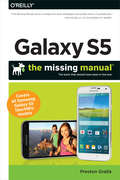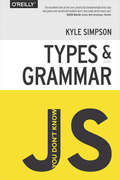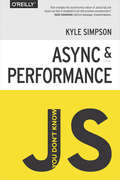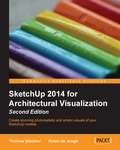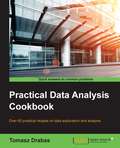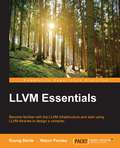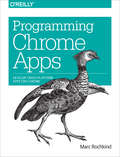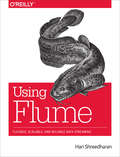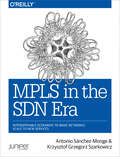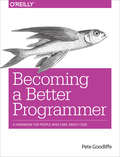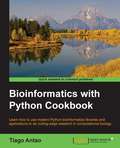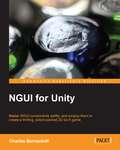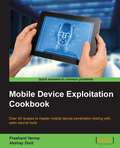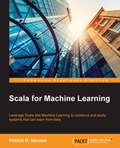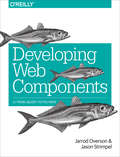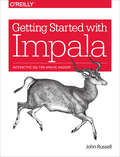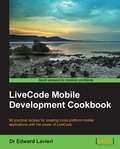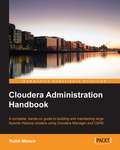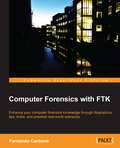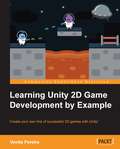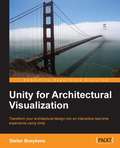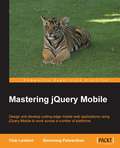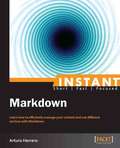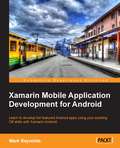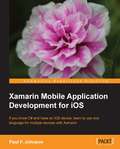- Table View
- List View
Galaxy S4: The Missing Manual
by Preston GrallaUnlock the potential of Samsung's outstanding smartphone with this fully illustrated, jargon-free guide from technology guru Preston Gralla. You'll quickly learn how to shoot high-res photos and HD video, keep your schedule, stay in touch, and enjoy your favorite media. Every page is packed with illustrations and valuable advice to help you get the most from the smartest phone in town. The important stuff you need to know: Get dialed in. Learn your way around the Galaxy S4's calling and texting features. Go online. Browse the Web, manage email, and download apps with Galaxy S4's 4G LTE network (or create your own hotspot). Master your media. Shoot and share pictures and video, organize and play your music library--and send it wirelessly to your TV or stereo. Be entertained now. Start watching movies and TV shows while they're still loading. Explore the world. Get news and weather, find a location, and navigate by GPS. Check your schedule. Use the convenient calendar app, and sync it with your Google and Outlook calendars.
You Don't Know JS: Types & Grammar
by Kyle SimpsonNo matter how much experience you have with JavaScript, odds are you don't fully understand the language. As part of the "You Don't Know JS" series, this compact guide explores JavaScript types in greater depth than previous treatments by looking at type coercion problems, demonstrating why types work, and showing you how to take advantage of these features.Like other books in this series, You Don't Know JS: Types & Grammar dives into trickier parts of the language that many JavaScript programmers simply avoid or assume don't exist (like types). Armed with this knowledge, you can achieve true JavaScript mastery.With this book you will:Get acquainted with JavaScript's seven types: null, undefined, boolean, number, string, object, and symbolUnderstand why JavaSript's unique array, string, and number characteristics may delight or confound youLearn how natives provide object wrappers around primitive valuesDive into the coercion controversy--and learn why this feature is useful in many casesExplore various nuances in JavaScript syntax, involving statements, expressions, and other features
You Don't Know JS: Async & Performance
by Kyle SimpsonNo matter how much experience you have with JavaScript, odds are you don't fully understand the language. As part of the "You Don't Know JS" series, this compact guide focuses on the new asynchronous features in JavaScript, which are often confusing to developers. You'll learn about promises, generators, and coroutines, all of which allow you to create more sophisticated single-page web applications that provide the features of a desktop application without tying up the user's browser.Like other books in this series, You Don't Know JS: Async & Performance dives into trickier parts of the language that many JavaScript programmers simply avoid. Armed with this knowledge, you can achieve true JavaScript mastery.
SketchUp 2014 for Architectural Visualization Second Edition
by Robin De Jongh Thomas BleicherBeginning with a quick start tutorial which will get you up and running with SketchUp 2014 quickly, you will move on to learning the key skills you will need to wow your clients with stunning visualizations through a series practical steps, tips and tricks. If you are a SketchUp user, from an amateur right through to an architectural technician, professional architect, or designer, this is the book for you. This book is also suitable as a companion to any architectural design or multimedia course, and is accessible to anyone who has learned the basics of SketchUp.
Practical Data Analysis Cookbook
by Tomasz DrabasOver 60 practical recipes on data exploration and analysis About This Book * Clean dirty data, extract accurate information, and explore the relationships between variables * Forecast the output of an electric plant and the water flow of American rivers using pandas, NumPy, Statsmodels, and scikit-learn * Find and extract the most important features from your dataset using the most efficient Python libraries Who This Book Is For If you are a beginner or intermediate-level professional who is looking to solve your day-to-day, analytical problems with Python, this book is for you. Even with no prior programming and data analytics experience, you will be able to finish each recipe and learn while doing so. What You Will Learn * Read, clean, transform, and store your data usng Pandas and OpenRefine * Understand your data and explore the relationships between variables using Pandas and D3.js * Explore a variety of techniques to classify and cluster outbound marketing campaign calls data of a bank using Pandas, mlpy, NumPy, and Statsmodels * Reduce the dimensionality of your dataset and extract the most important features with pandas, NumPy, and mlpy * Predict the output of a power plant with regression models and forecast water flow of American rivers with time series methods using pandas, NumPy, Statsmodels, and scikit-learn * Explore social interactions and identify fraudulent activities with graph theory concepts using NetworkX and Gephi * Scrape Internet web pages using urlib and BeautifulSoup and get to know natural language processing techniques to classify movies ratings using NLTK * Study simulation techniques in an example of a gas station with agent-based modeling In Detail Data analysis is the process of systematically applying statistical and logical techniques to describe and illustrate, condense and recap, and evaluate data. Its importance has been most visible in the sector of information and communication technologies. It is an employee asset in almost all economy sectors. This book provides a rich set of independent recipes that dive into the world of data analytics and modeling using a variety of approaches, tools, and algorithms. You will learn the basics of data handling and modeling, and will build your skills gradually toward more advanced topics such as simulations, raw text processing, social interactions analysis, and more. First, you will learn some easy-to-follow practical techniques on how to read, write, clean, reformat, explore, and understand your data--arguably the most time-consuming (and the most important) tasks for any data scientist. In the second section, different independent recipes delve into intermediate topics such as classification, clustering, predicting, and more. With the help of these easy-to-follow recipes, you will also learn techniques that can easily be expanded to solve other real-life problems such as building recommendation engines or predictive models. In the third section, you will explore more advanced topics: from the field of graph theory through natural language processing, discrete choice modeling to simulations. You will also get to expand your knowledge on identifying fraud origin with the help of a graph, scrape Internet websites, and classify movies based on their reviews. By the end of this book, you will be able to efficiently use the vast array of tools that the Python environment has to offer. Style and approach This hands-on recipe guide is divided into three sections that tackle and overcome real-world data modeling problems faced by data analysts/scientist in their everyday work. Each independent recipe is written in an easy-to-follow and step-by-step fashion.
LLVM Essentials
by Mayur Pandey Suyog SardaBecome familiar with the LLVM infrastructure and start using LLVM libraries to design a compiler About This Book * Learn to use the LLVM libraries to emit intermediate representation (IR) from high-level language * Build your own optimization pass for better code generation * Understand AST generation and use it in a meaningful way Who This Book Is For This book is intended for those who already know some of the concepts of compilers and want to quickly get familiar with the LLVM infrastructure and the rich set of libraries that it provides. What You Will Learn * Get an introduction to LLVM modular design and LLVM tools * Convert frontend code to LLVM IR * Implement advanced LLVM IR paradigms * Understand the LLVM IR Optimization Pass Manager infrastructure and write an optimization pass * Absorb LLVM IR transformations * Understand the steps involved in converting LLVM IR to Selection DAG * Implement a custom target using the LLVM infrastructure * Get a grasp of C's frontend clang, an AST dump, and static analysis In Detail LLVM is currently the point of interest for many firms, and has a very active open source community. It provides us with a compiler infrastructure that can be used to write a compiler for a language. It provides us with a set of reusable libraries that can be used to optimize code, and a target-independent code generator to generate code for different backends. It also provides us with a lot of other utility tools that can be easily integrated into compiler projects. This book details how you can use the LLVM compiler infrastructure libraries effectively, and will enable you to design your own custom compiler with LLVM in a snap. We start with the basics, where you'll get to know all about LLVM. We then cover how you can use LLVM library calls to emit intermediate representation (IR) of simple and complex high-level language paradigms. Moving on, we show you how to implement optimizations at different levels, write an optimization pass, generate code that is independent of a target, and then map the code generated to a backend. The book also walks you through CLANG, IR to IR transformations, advanced IR block transformations, and target machines. By the end of this book, you'll be able to easily utilize the LLVM libraries in your own projects. Style and approach This book deals with topics sequentially, increasing the difficulty level in a step-by-step approach. Each topic is explained with a detailed example, and screenshots are included to help you understand the examples.
Programming Chrome Apps
by Marc RochkindPut your web app design skills to work by learning how to create powerful and portable Chrome Apps. With this practical book, you'll learn how to build Google's unique apps to behave just like native apps so they can interact with hardware devices, access external files, and send notifications.Author Marc Rochkind takes you through a hands-on, objective tour of Chrome Apps, which run on any platform that supports the Chrome browser--including OS X, Windows, Linux, as well as Android and iOS. If you know how to work with HTML, CSS, JavaScript, and the DOM, you're ready to get started.Learn how to build, run, and debug Chrome Apps step-by-stepUse Chrome Apps to access local files, sync files, and external filesTake advantage of key-value-pair APIs, including sync storage and IndexedDBUse WebSockets, Google Cloud Messaging, and other networking methodsDisplay graphics and images with Canvas, SVG, and the Media Galleries APIUse alarms, context menus, location, the camera, Bluetooth, USB, and other APIsPublish apps to the Chrome Web Store with the Chrome Dev Editor
Using Flume
by Hari ShreedharanHow can you get your data from frontend servers to Hadoop in near real time? With this complete reference guide, you'll learn Flume's rich set of features for collecting, aggregating, and writing large amounts of streaming data to the Hadoop Distributed File System (HDFS), Apache HBase, SolrCloud, Elastic Search, and other systems.Using Flume shows operations engineers how to configure, deploy, and monitor a Flume cluster, and teaches developers how to write Flume plugins and custom components for their specific use-cases. You'll learn about Flume's design and implementation, as well as various features that make it highly scalable, flexible, and reliable. Code examples and exercises are available on GitHub.Learn how Flume provides a steady rate of flow by acting as a buffer between data producers and consumersDive into key Flume components, including sources that accept data and sinks that write and deliver itWrite custom plugins to customize the way Flume receives, modifies, formats, and writes dataExplore APIs for sending data to Flume agents from your own applicationsPlan and deploy Flume in a scalable and flexible way--and monitor your cluster once it's running
MPLS in the SDN Era: Interoperable Scenarios to Make Networks Scale to New Services
by Antonio Sanchez Monge Krzysztof Grzegorz SzarkowiczHow can you make multivendor services work smoothly on today's complex networks? This practical book shows you how to deploy a large portfolio of multivendor Multiprotocol Label Switching (MPLS) services on networks, down to the configuration level. You'll learn where Juniper Network's Junos, Cisco's IOS XR, and OpenContrail, interoperate and where they don't.Two network and cloud professionals from Juniper describe how MPLS technologies and applications have rapidly evolved through services and architectures such as Ethernet VPNs, Network Function Virtualization, Seamless MPLS, Egress Protection, External Path Computation, and more. This book contains no vendor bias or corporate messages, just solid information on how to get a multivendor network to function optimally.Topics include:Introduction to MPLS and Software-Defined Networking (SDN)The four MPLS Builders (LDP, RSVP-TE, IGP SPRING, and BGP)Layer 3 unicast and multicast MPLS services, Layer 2 VPN, VPLS, and Ethernet VPNInter-domain MPLS ServicesUnderlay and overlay architectures: data centers, NVO, and NFVCentralized Traffic Engineering and TE bandwidth reservationsScaling MPLS transport and servicesTransit fast restoration based on the IGP and RSVP-TEFIB optimization and egress service for fast restoration
Becoming a Better Programmer
by Pete GoodliffeIf you're passionate about programming and want to get better at it, you've come to the right source. Code Craft author Pete Goodliffe presents a collection of useful techniques and approaches to the art and craft of programming that will help boost your career and your well-being.Goodliffe presents sound advice that he's learned in 15 years of professional programming. The book's standalone chapters span the range of a software developer's life--dealing with code, learning the trade, and improving performance--with no language or industry bias. Whether you're a seasoned developer, a neophyte professional, or a hobbyist, you'll find valuable tips in five independent categories:Code-level techniques for crafting lines of code, testing, debugging, and coping with complexityPractices, approaches, and attitudes: keep it simple, collaborate well, reuse, and create malleable codeTactics for learning effectively, behaving ethically, finding challenges, and avoiding stagnationPractical ways to complete things: use the right tools, know what "done" looks like, and seek help from colleaguesHabits for working well with others, and pursuing development as a social activity
Bioinformatics with Python Cookbook
by Tiago AntaoIf you have intermediate-level knowledge of Python and are well aware of the main research and vocabulary in your bioinformatics topic of interest, this book will help you develop your knowledge further.
NGUI for Unity
by Charles BernardoffAn easy-to-follow, step-by-step tutorial focusing on practical situations and manipulations, guiding you to create a concrete Graphical User Interface and a simple 2D game. If you are a Unity 3D developer looking forward to learn NGUI for Unity, then this book is for you. Prior knowlege of C# scripting is expected. Additional knowledge of Unity 3D Editor, GameObject and creating/adding scripts to GameObject would be beneficial; however, no prior knowledge of NGUI is required.
Mobile Device Exploitation Cookbook
by Akshay Dixit Prashant Kumar VermaThis book is intended for mobile security enthusiasts and penetration testers who wish to secure mobile devices to prevent attacks and discover vulnerabilities to protect devices.
Scala for Machine Learning
by Patrick R. NicolasAre you curious about AI? All you need is a good understanding of the Scala programming language, a basic knowledge of statistics, a keen interest in Big Data processing, and this book!
Developing Web Components
by Jason Strimpel Jarrod OversonAlthough web components are still on the bleeding edge--barely supported in modern browsers--the technology is also moving extremely fast. This practical guide gets you up to speed on the concepts underlying W3C's emerging standard and shows you how to build custom, reusable HTML5 Web Components.Regardless of your experience with libraries such as jQuery and Polymer, this book teaches JavaScript developers the DOM manipulations these libraries perform. You'll learn how to build a basic widget with vanilla JavaScript and then convert it into a web component that's semantic, declarative, encapsulated, consumable, and maintainable. With custom components, the Web can finally fulfill its potential as a natively extensible application platform. This book gets you in at the right time.Understand core concepts (such as normal flow and positioning, and Z-index) for properly positioning, dragging, and resizing elementsExplore UI concepts and patterns typically abstracted away by Dojo, jQuery UI, Kendo UI, and other librariesDive into the W3C standard and convert your working widget example into a fully functioning web componentLearn how to encapsulate, package, and deploy your web components with Google's Polymer framework
Getting Started with Impala
by John RussellLearn how to write, tune, and port SQL queries and other statements for a Big Data environment, using Impala--the massively parallel processing SQL query engine for Apache Hadoop. The best practices in this practical guide help you design database schemas that not only interoperate with other Hadoop components, and are convenient for administers to manage and monitor, but also accommodate future expansion in data size and evolution of software capabilities.Ideal for database developers and business analysts, Getting Started with Impala includes advice from Cloudera's development team, as well as insights from its consulting engagements with customers.Learn how Impala integrates with a wide range of Hadoop componentsAttain high performance and scalability for huge data sets on production clustersExplore common developer tasks, such as porting code to Impala and optimizing performanceUse tutorials for working with billion-row tables, date- and time-based values, and other techniquesLearn how to transition from rigid schemas to a flexible model that evolves as needs changeTake a deep dive into joins and the roles of statistics
LiveCode Mobile Development Cookbook
by Dr Edward LavieriIf you are a LiveCode mobile developer looking to improve your existing skills, add efficiencies to your code, or want a better understanding of LiveCode's capabilities, then LiveCode Mobile Development Cookbook is a must-have for you. The reader should at least have a basic understanding of LiveCode and mobile application development.
Cloudera Administration Handbook
by Rohit MenonAn easy-to-follow Apache Hadoop administrator's guide filled with practical screenshots and explanations for each step and configuration. This book is great for administrators interested in setting up and managing a large Hadoop cluster. If you are an administrator, or want to be an administrator, and you are ready to build and maintain a production-level cluster running CDH5, then this book is for you.
Computer Forensics with FTK
by Fernando CarboneThis tutorial contains detailed instructions with useful integrated examples that help you understand the main features of FTK and how you can use it to analyze evidence. This book has clear and concise guidance in an easily accessible format. This tutorial-based guide is great for you if you want to conduct digital investigations with an integrated platform. Whether you are new to Computer Forensics or have some experience, this book will help you get started with FTK so you can analyze evidence effectively and efficiently. If you are a law enforcement official, corporate security, or IT professional who needs to evaluate the evidentiary value of digital evidence, then this book is ideal for you.
Learning Unity 2D Game Development by Example
by Venita PereiraIf you are interested in creating your very own 2D games from scratch, then this book will give you all the tools you need to succeed. Whether you are completely new to Unity or have used Unity before and would like to learn about the new 2D features of Unity, this book is for you.
Unity for Architectural Visualization
by Stefan BoeykensA tutorial packed with practical examples and screenshots to help you become an expert in architectural visualization using Unity.This book is written for students and professional architects who know how to model buildings in 3D and have a need to turn their design into an interactive model, even if you have never used Unity before. Experience with visualization and programming will be helpful, but is not required to follow along. You will learn all the basics throughout with the help of step-by-step examples. The majority of the examples work fine in any recent version of the Unity software, on Windows or Mac, but occasionally features of the Pro version are required.
Mastering jQuery Mobile
by Shreerang Patwardhan Chip LambertYou've started down the path of jQuery Mobile, now begin mastering some of jQuery Mobile's higher level topics. Go beyond jQuery Mobile's documentation and master one of the hottest mobile technologies out there. Previous JavaScript and PHP experience can help you get the most out of this book.
Instant Markdown
by Arturo HerreroGet to grips with a new technology, understand what it is and what it can do for you, and then get to work with the most important features and tasks. A quick, clear, concise tutorial guide-based approach that will help you to get started with Markdown.Instant Markdown is for people who are interested in an introduction to Markdown. You will not need any specific knowledge about programming or markup languages. This book will give you many ideas to use and take full potential of Markdown over many different services.
Xamarin Mobile Application Development for Android
by Mark ReynoldsA step-by-step tutorial that follows the development of a simple Android app from end to end, through troubleshooting, and then distribution. The language used assumes a knowledge of basic C#. If you are a C# developer with a desire to develop Android apps and want to enhance your existing skill set, then this book is for you. It is assumed that you have a good working knowledge of C#, .NET, and object-oriented software development. Familiarity with rich client technologies such as WPF or Silverlight is also helpful, but not required.
Xamarin Mobile Application Development for iOS
by Paul F. JohnsonThis book is a standard tutorial aimed at teaching you everything you need to know about iOS app development using Xamarin.This book is written for those who are new to iOS app development as well as more experienced developers who just need a quick reference book. It is assumed that you are already comfortable using C#. Those teaching iOS to new students will also find this book invaluable as a form of reference material.
